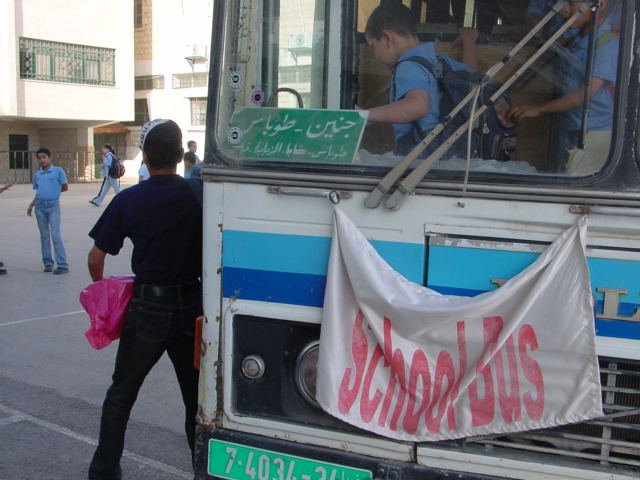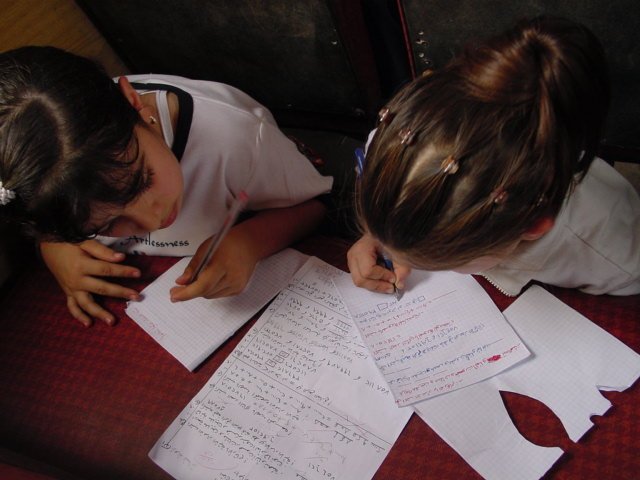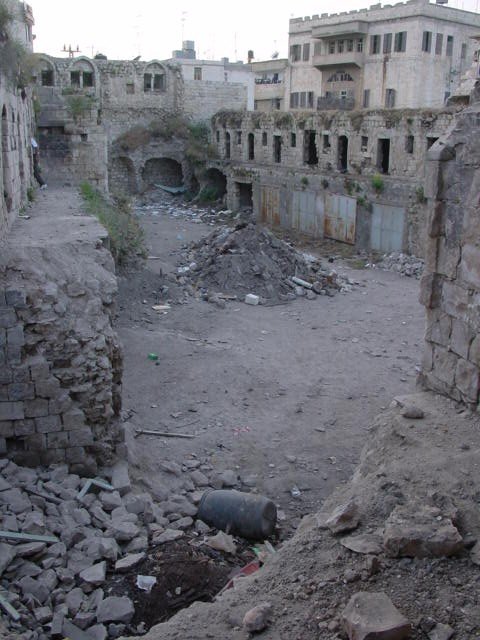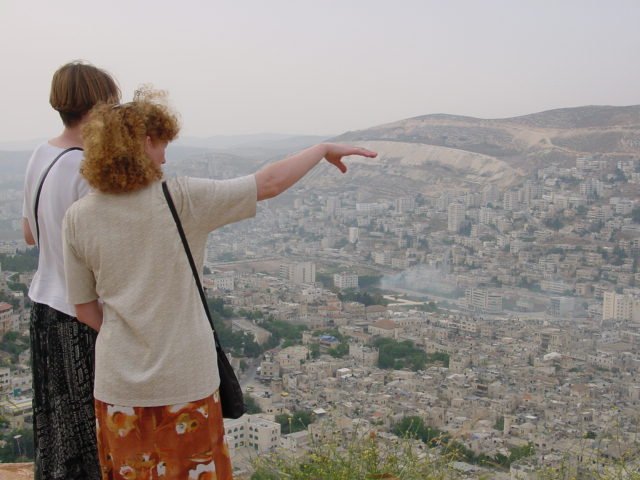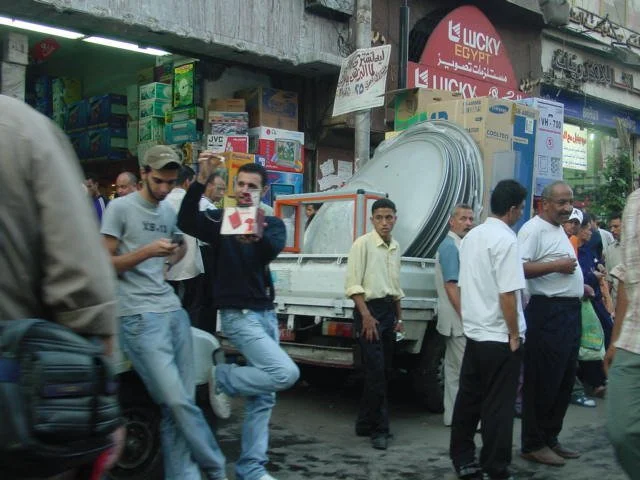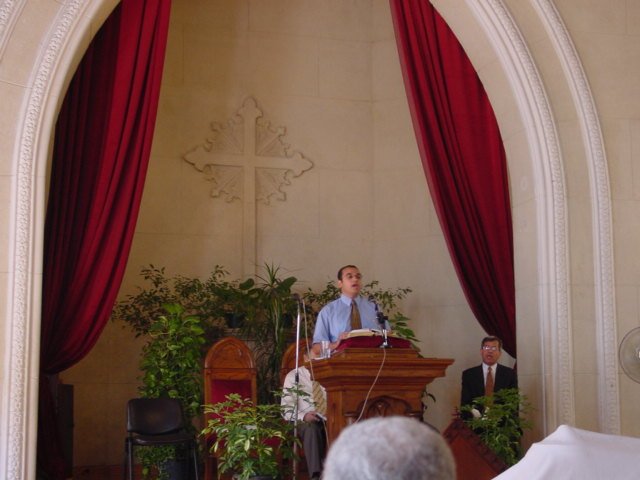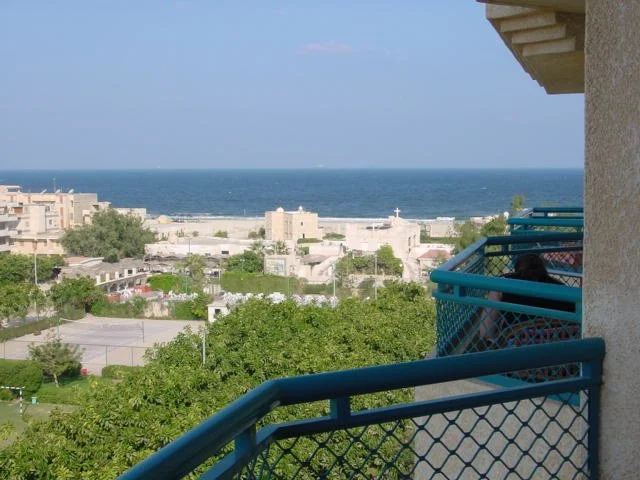October, 2003
The other half left around 8:30 heading to Jayyous to see the impact the Wall has had on that community, cut off from their land, from their former day labor jobs in Israel, and from the West Bank.
Today a British group was scheduled to visit. We advised them that the Jalame checkpoint was their best bet, having a marginally better track record (of letting foreigners pass) than Hamra. Astoundingly, they were allowed in (but not their tour guide or their bus driver, both of whom are Palestinians with Jerusalem IDs, and so are technically not allowed to travel in the Occupied Territories - except of course East Jerusalem where they live).
This afternoon a group from Chicago was due to come visit us, but they were refused entry at Hamra checkpoint. "This is not a place for tourists. If you know others on their way, tell them not to come," was the message from the soldiers.
The Italian, who had just done two stints in Afghanistan, said she was exhausted by this place. The stress and daily difficulties in Jenin far outweigh what she saw in Afghanistan - sobering thought.
After twenty minutes, we arrived at the checkpoint. And we were told to wait. Beside us were two UN vehicles and an ambulance, and on the other side another ambulance - all of them also told to wait. Marthame and the driver went to talk with a soldier standing on the tank. He said, "OK. Bring the bus forward." We boarded the bus, just as a jeep came to supplement the tank. We crept forward. "Hey you!" barked a loudspeaker from the jeep. "I'm talking to you! Back up!" Marthame moved to step off the bus, at which point the tank's gun barrel pivoted towards the bus. Marthame got back on.
The Jenin school bus tried to leave in the morning, but was held up at the checkpoint for four and a half hours. No intervention - whether through the military coordinating office, the Latin Patriarchate, the Italian nuns in Jenin - could get the bus through. The kids have missed tons of school this year, more than kids should be expected to bear. At 11:30, they turned around and headed home - too late to catch the taxis through the olive groves and on to school.
"The solution is with God. He can reconcile us. We need to live in peace. I've lost my son, and a Jewish man loses his son. What has been gained? The solution is with God and God alone."
Today a group of eleven Presbyterian Peace Fellowship folks managed to cross the checkpoints and get to Zababdeh.
This morning, Elizabeth and Andrea said sad farewells to the lovely people at the Anglican compound. We enjoyed a wonderful time with them, and will miss them greatly.
The amount of firepower needed to destroy these ancient solid stone buildings must have been unbelievable. No wonder our friends living near the Old City were so traumatized.
The message shared with the littlest ones was "Don't fear. God is with us." A very appropriate lesson for children living in Nablus these days.
Marthame noticed with amusement that the computer error messages always focus on possible problems within the computer or modem - never suggesting that the problem might be related to military incursions or faulty regional infrastructure due to the latter.
Apparently, there was a "curfew" in Zababdeh from about 4:00 am to 9:30 am, "curfew" meaning "stay at home until we say so or you get shot." Literally.
The priests of Zababdeh are taking good care of Marthame the bachelor in Elizabeth's extended absence from here. Fr. Aktham has issued an open invitation for lunch until Elizabeth returns, and Fr. Thomas and Fr. Firas have invited Marthame over on several different occasions to fill in the gaps in his stomach.
Our host talked about the Spring 2002 incursions: she showed us the bullet holes and broken stones of her home, how all her windows were shattered, how she was staying in one interior room, afraid to move about for fear of being shot. "The tanks were right there," she said, pointing at the street just below her balcony.
Marthame joined with two English teachers from the University in a trip up to Jalame to visit native son Nasser Abu Farha. Abu Farha is currently working on his PhD at the University of Wisconsin on the possibility of a long-lasting solution to the conflict here. It has sprung into a grassroots organization. To sit with him was a pleasure, to hear a man committed to real peace, who isn't afraid to speak the truth - to whatever community - and to both challenge myths and get to the root causes of the conflict.
The "road" was the roughest Elizabeth had ever been on in Palestine; often she was convinced we were about to roll over - sometimes to the side, sometimes forward. Elizabeth remembered that the last time she was in Nablus, a university student said a friend of hers died in a car accident in the hills, trying to get to school. Thank God we arrived safely.
Andrea and Marthame went to Tubas in the morning to film church and Sylvia, one of our subjects there. A college student at An-Najah University in Nablus, she travels weekly across nearly impossible roads into that sealed-off city. We wanted to start her section off in her context, among the Christian minority of this village.
Marthame waited for a few minutes with school children trying to go home, others simply trying to pass for one reason or another. The soldiers began to get rough with the crowd, shoving and grabbing children and older people. It wouldn't be long before somebody would lose their patience with all of this and it would turn uglier than it was, so Marthame retreated and started walking back towards Jerusalem.
We tried to cross the bridge after our flight, but were informed it was closed because of Jewish holidays. No doubt the Israeli attack near Damascus will set things back throughout the region. We were initially told the bridge was closed until Friday, a time loss we couldn't suffer, but this turned out to be nothing more than rumor.
After a couple hours on the road towards Cairo, passing green fields irrigated by the Nile, we spent the afternoon and evening going around town. Cairo is a world apart, buzzing and teeming with crowded, dusty, noisy life.
We made our way to the Saray Presbyterian Church in Alexandria to share in worship with Pastor Rizk and the rest of the community there. It is a joy to get to share in Presbyterian worship again. The sermon was in both English and Arabic for everyone's benefit.
As it was our last full day here, we made the most of it, playing soccer on the (grass!) field, swimming in the pool, and playing a swapping game.
Alexandria is a waterfront city, which means that underground burial was odd business. Water levels beneath the ground rose high enough to do their damage through the centuries, and the high humidity left remains which disintegrated into dust when simply touched by those excavating the site.
Suddenly traveling seems like a thoroughly pleasant experience rather than an endless series of waiting at checkpoints and the whims of various soldiers.



